Intel Core i7-10700 vs Core i7-10700K Review: Is 65W Comet Lake an Option?
by Dr. Ian Cutress on January 21, 2021 10:30 AM EST- Posted in
- CPUs
- Intel
- Core i7
- Z490
- 10th Gen Core
- Comet Lake
- i7-10700K
- i7-10700
CPU Tests: Legacy and Web
In order to gather data to compare with older benchmarks, we are still keeping a number of tests under our ‘legacy’ section. This includes all the former major versions of CineBench (R15, R11.5, R10) as well as x264 HD 3.0 and the first very naïve version of 3DPM v2.1. We won’t be transferring the data over from the old testing into Bench, otherwise it would be populated with 200 CPUs with only one data point, so it will fill up as we test more CPUs like the others.
The other section here is our web tests.
Web Tests: Kraken, Octane, and Speedometer
Benchmarking using web tools is always a bit difficult. Browsers change almost daily, and the way the web is used changes even quicker. While there is some scope for advanced computational based benchmarks, most users care about responsiveness, which requires a strong back-end to work quickly to provide on the front-end. The benchmarks we chose for our web tests are essentially industry standards – at least once upon a time.
It should be noted that for each test, the browser is closed and re-opened a new with a fresh cache. We use a fixed Chromium version for our tests with the update capabilities removed to ensure consistency.
Mozilla Kraken 1.1
Kraken is a 2010 benchmark from Mozilla and does a series of JavaScript tests. These tests are a little more involved than previous tests, looking at artificial intelligence, audio manipulation, image manipulation, json parsing, and cryptographic functions. The benchmark starts with an initial download of data for the audio and imaging, and then runs through 10 times giving a timed result.
We loop through the 10-run test four times (so that’s a total of 40 runs), and average the four end-results. The result is given as time to complete the test, and we’re reaching a slow asymptotic limit with regards the highest IPC processors.

Google Octane 2.0
Our second test is also JavaScript based, but uses a lot more variation of newer JS techniques, such as object-oriented programming, kernel simulation, object creation/destruction, garbage collection, array manipulations, compiler latency and code execution.
Octane was developed after the discontinuation of other tests, with the goal of being more web-like than previous tests. It has been a popular benchmark, making it an obvious target for optimizations in the JavaScript engines. Ultimately it was retired in early 2017 due to this, although it is still widely used as a tool to determine general CPU performance in a number of web tasks.
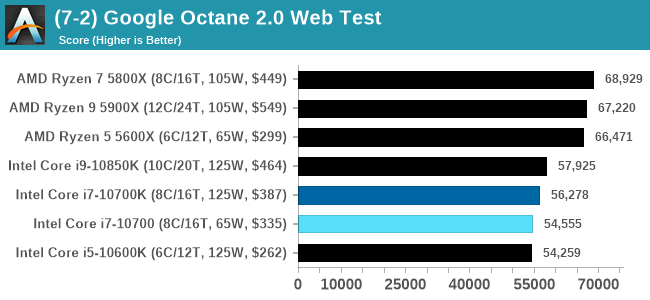
Speedometer 2: JavaScript Frameworks
Our newest web test is Speedometer 2, which is a test over a series of JavaScript frameworks to do three simple things: built a list, enable each item in the list, and remove the list. All the frameworks implement the same visual cues, but obviously apply them from different coding angles.
Our test goes through the list of frameworks, and produces a final score indicative of ‘rpm’, one of the benchmarks internal metrics.
We repeat over the benchmark for a dozen loops, taking the average of the last five.
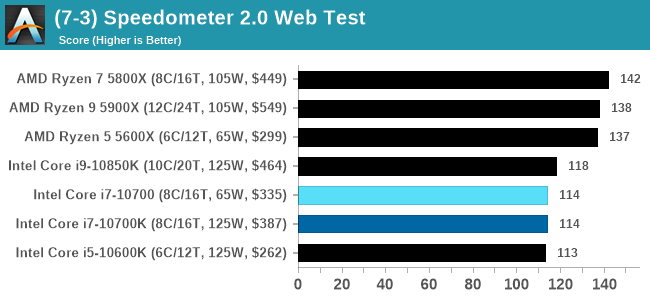
Legacy Tests
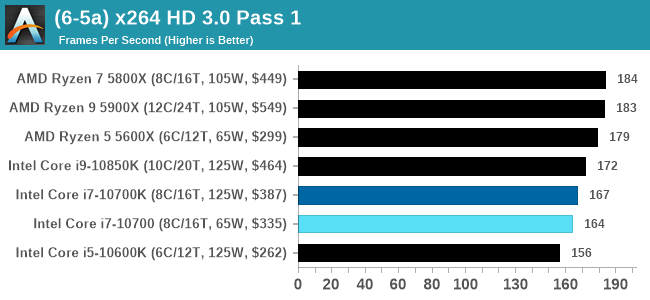
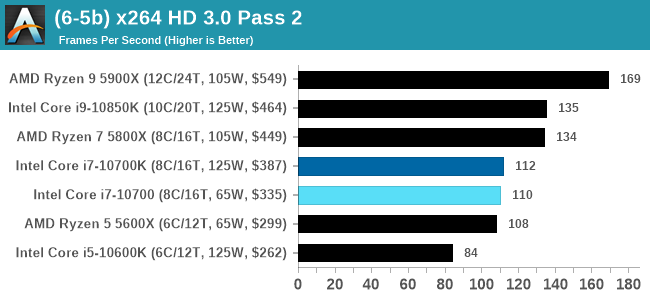
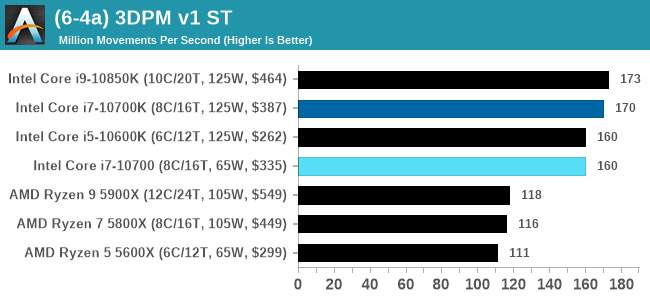
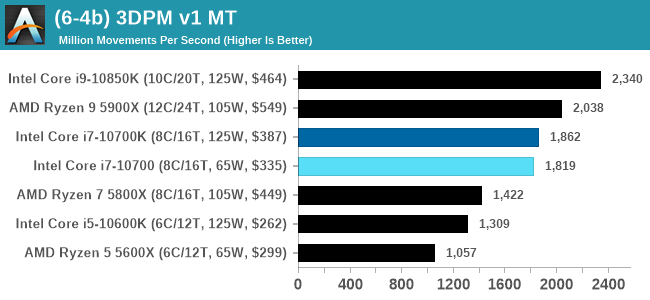
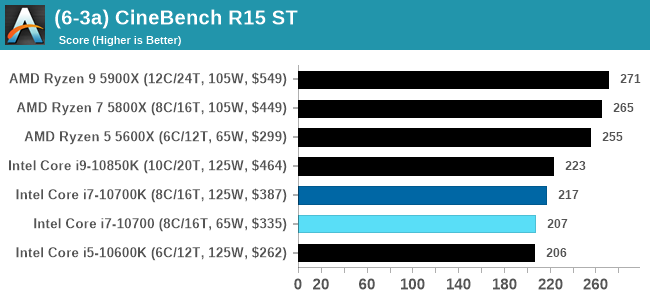
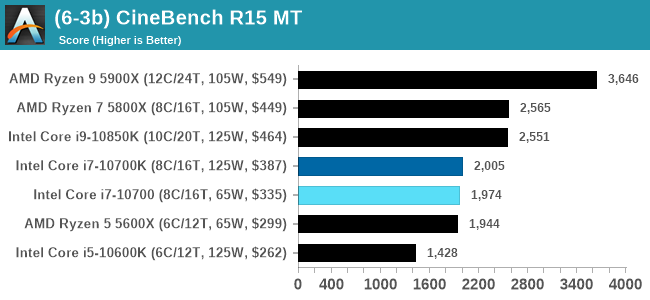


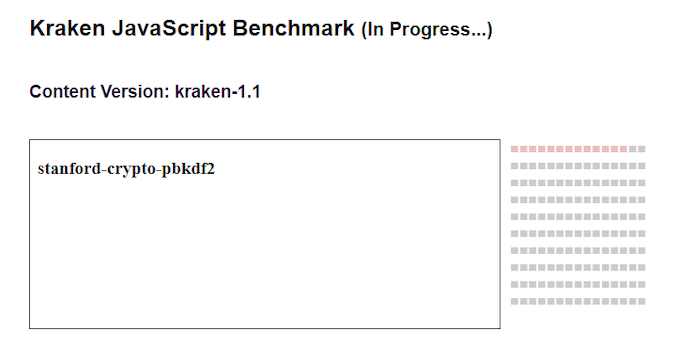
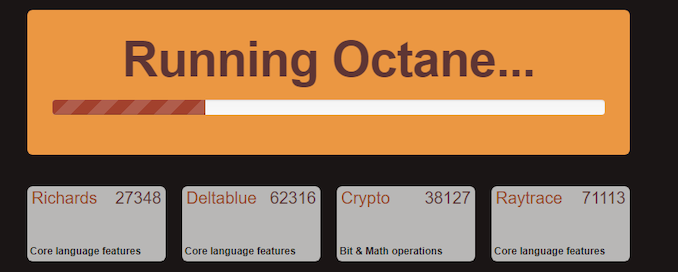
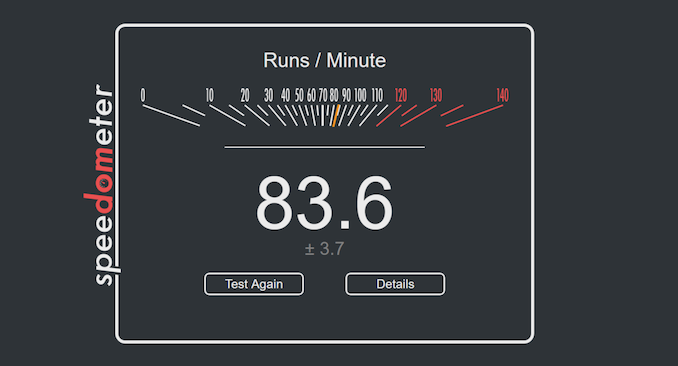








210 Comments
View All Comments
Mr Perfect - Thursday, January 21, 2021 - link
Yeah, if Alder Lake doesn't get things under control later this year, my next ITX build will also be Ryzen. There's just no sense in using a CPU drawing 200+ watts in SFF when cooling the current crop of GPUs is hard enough as it is!DanNeely - Thursday, January 21, 2021 - link
In SFF I suspect you'll be operating well below 215W. If not because the mobo can't supply the power, but because your small form factor cooler can't handle the heat and you're limited to short turbo periods due to thermal throttling.Mr Perfect - Thursday, January 21, 2021 - link
You should well be able to run the 215watt mode if you're daring. Some folks over on r\sffpc use the big CPUs, because the mITX boards have power delivery similar to the ATX boards and do support them. The problem is they report idle temps around 50C and gaming temps around 70C.Personally, I'm just not willing to run those temps. My current ITX build is using an older 95watt CPU(that actually drew 95watts at turbo) and idles at 35C and games around 50C. A new CPU with an idle temp that's the same as my current load temp is just mind boggling.
Dug - Thursday, January 21, 2021 - link
You do realize that 50 and 70c are not anywhere close to being worried about anything? You said personally you aren't willing to run those temps. Have you even looked into what modern processors are capable of? Have you ever used a laptop, which will hit that temp just by opening the lid?Calin - Friday, January 22, 2021 - link
I remember one processor (or maybe GPU) had temperature limits (internal temperature, as measured on-die) of a bit over 100 Celsius. It might have been an NVidia chip, however I remember Intel coming close to that.Compared to that, 50 Celsius at idle and 70 at load is positively arctic ;)
at_clucks - Friday, January 22, 2021 - link
Perhaps idling at 50 is not outstanding but full load at 70 definitely is, especially for a cramped SFF PC.Spunjji - Friday, January 22, 2021 - link
It all depends on the fan speeds, really. 50 at idle is extremely impressive if the system is silent!Wineohe - Thursday, January 21, 2021 - link
I too just picked up a 5600X for list of $299 to build a NAS. Paired it with a $120 B550, some extra RAM and a video card I had collecting dust. Wish I would have researched the case more though. Ironically it’s considerably faster than my desktop with it’s pokey old i7-6800K. I’ll wait until the 5950X comes more readily available for a upgrade.schujj07 - Friday, January 22, 2021 - link
Using a 5600X for a NAS, I assume it is for home and not enterprise, is total overkill. You would be fine using an Athlon 200G in a home NAS and would never notice the difference.magreen - Friday, January 22, 2021 - link
I run a pentium M for my Ubuntu server/NAS